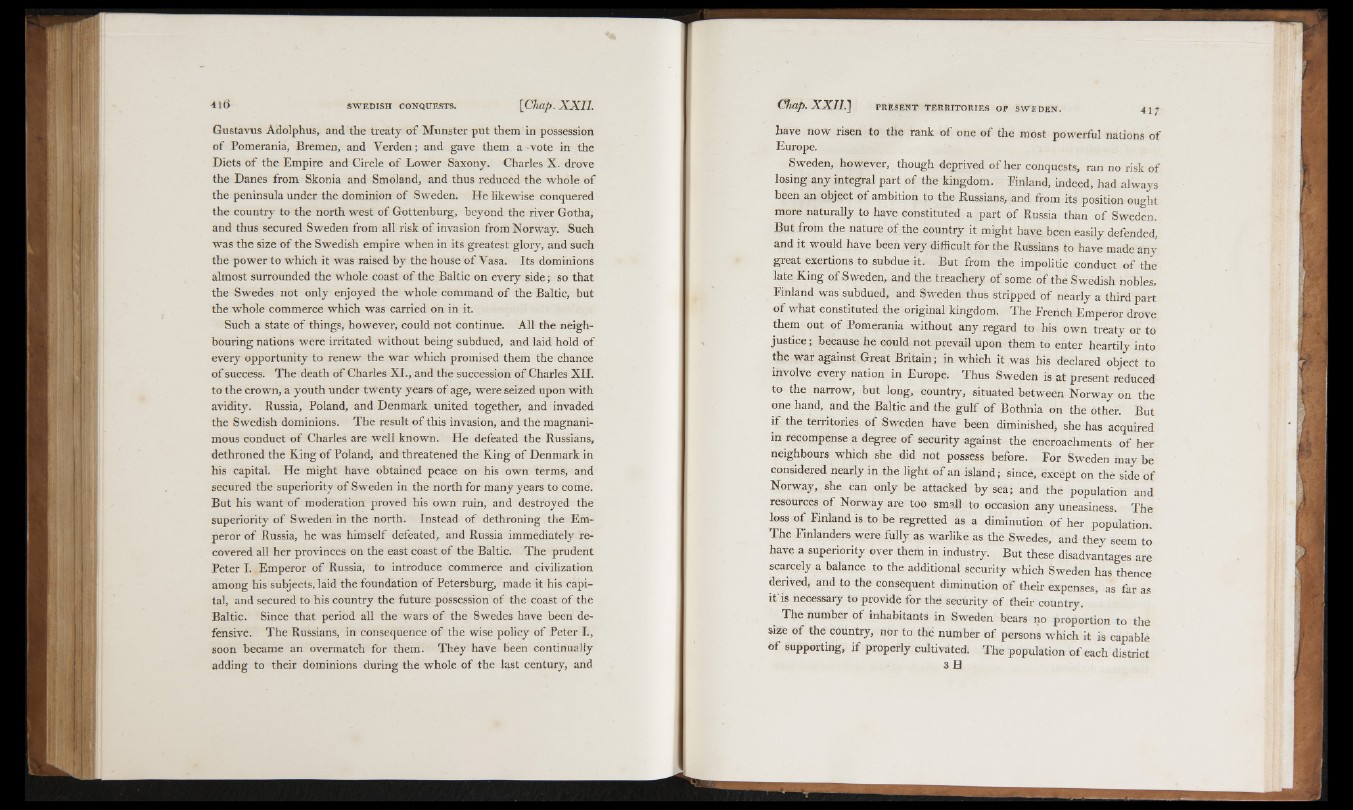
Gustavus Adolphus, and the treaty of Munster put them in possession
of Pomerania, Bremen, and Yerden; and gave them a vote in the
Diets of the Empire and Circle o f Lower Saxony. Charles X. drove
the Danes from Skonia and Smoland, and thus reduced the whole of
the peninsula under the dominion of Sweden. He likewise conquered
the country to the north west of Gottenburg, beyond the river Gotha,
and thus secured Sweden from all risk o f invasion from Norway. Such
was the size o f the Swedish empire when in its greatest glory, and such
the power to which it was raised by the house o f Vasa. Its dominions
almost surrounded the whole coast of the Baltic on every side; so that
the Swedes not only enjoyed the whole command of the Baltic, but
the whole commerce which was carried on in it.
Such a state o f things, however, could not continue. All the neighbouring
nations were irritated without being subdued, and laid hold of
every opportunity to renew the war which promised them the chance
o f success. The death of Charles XI., and the succession of Charles XII.
to the crown, a youth under twenty years o f age, were seized upon with
avidity. Russia, Poland, and Denmark united together, and invaded
the Swedish dominions. The result of this invasion, and the magnanimous
conduct o f Charles are well known. He defeated the Russians,
dethroned the King o f Poland, and threatened the King of Denmark in
his capital. He might have obtained peace on his own terms, and
secured the superiority of Sweden in the north for many years to come.
But his want o f moderation proved his own ruin, and destroyed the
superiority o f Sweden in the north. Instead o f dethroning the Emperor
of Russia, he was himself defeated, and Russia immediately recovered
all her provinces on the east coast,of the Baltic. The prudent
Peter I. Emperor of Russia, to introduce commerce and civilization
among his subjects, laid the foundation of Petersburg, made it his capital,
and secured to his country the future possession of the coast of the
Baltic. Since that period all the wars o f the Swedes have been defensive.
The Russians, in consequence o f the wise policy of Peter I.,
soon became an overmatch for them. They have been continually
adding to their dominions during the whole o f the last century, and
have now risen to the rank o f one o f the most powerful nations of
Europe.
Sweden, however, though deprived o f her conquests, ran no risk of
losing any integral part o f the kingdom. Finland, indeed, had always
been an object of ambition to the Russians, and from its position ought
more naturally to have Constituted a part o f Russia than o f Sweden.
But from the nature of the country it might have been easily defended,
and it would have been very difficult for the Russians to have made any
great exertions to subdue it. But from the impolitic conduct o f the
late King o f Swèden, and the treachery o f some o f the Swedish nobles,
Finland was subdued, and Sweden thus stripped o f nearly a third part
o f what constituted the original kingdom. The French Emperor drove
them out o f Pomerania without any regard to his own treaty or to
justice ; because he could not prevail upon them to enter heartily into
the war against Great Britain; in which it was his declared object to
involve every nation in Europe. Thus Sweden is at present reduced
to the narrow, but long, country, situated between Norway on the
one hand, and the Baltic and the gulf o f Bothnia on the other. But
if the territories o f Sweden have been diminished, she has acquired
in recompense a degree o f security against the encroachments o f her
neighbours which she did not possess before. For Sweden may be
considered nearly in the light o f an island; since, except on thé side of
Norway, she can only be attacked by sea; and the population and
resources o f Norway are too small to occasion any uneasiness. The
loss of Finland is to be regretted as a diminution o f her population.
The Finlanders were fully as warlike as the Swedes, and they seem to
have a superiority over them in industry. But these disadvantages are
scarcely a balance to the additional security which Sweden has thence
derived, and to the consequent diminution o f their expenses, as far as
i f is necessary to provide for the security o f their country.
The number o f inhabitants in Sweden bears no proportion to the
size of the country, nor to thé number o f persons which it is capable
o f supporting, i f properly cultivated. The population o f each district
3 H